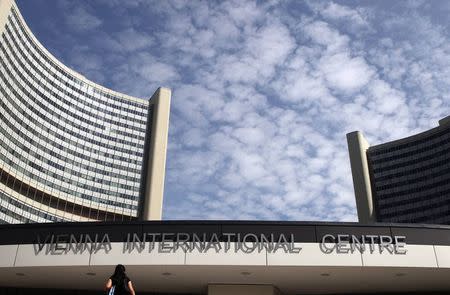Iran, six powers agree to four-month extension of nuclear talks: envoys
By Parisa Hafezi and Fredrik Dahl VIENNA (Reuters) - Iran and six world powers on Friday agreed to a four-month extension of negotiations on a long-term nuclear deal that would gradually end sanctions on Tehran in exchange for curbs on its nuclear programme, diplomats close to the talks said. Iran, the United States, Britain, France, Germany, Russia and China had set a July 20 deadline to complete a long-term agreement that would resolve the decade-old dispute over Tehran's nuclear ambitions. But diplomats said they were unable to overcome significant differences on major sticking points. "We have reached an agreement to extend the talks," a senior Iranian diplomat told Reuters on condition of anonymity. Several Western diplomats echoed his remarks. The extension agreed to on Friday begins on July 21 and negotiations on a long-term deal are likely to resume in September, diplomats said. They added that the talks were set to conclude by late November. It has been clear for days that Iran and the six powers would miss the Sunday deadline to reach an accord due to disagreements on a number of key issues in the discussions. Among the issues dividing them are the permissible scope of Iran's nuclear fuel production capacity and how to address the country's suspected past atomic bomb research. The negotiations began in February in Vienna. The talks are taking place because of a preliminary agreement reached in Geneva in November 2013 that gave Iran limited sanctions relief in exchange for halting some nuclear activities and created time and space for the negotiation of a comprehensive deal to end the decade-long dispute. But it remains uncertain whether four more months of high-stakes talks will yield a final agreement, since the underlying differences remain significant after six rounds of meetings this year. Western nations fear Iran's nuclear programme may be aimed at developing a nuclear weapons capability. Tehran denies this. The powers want Iran to significantly scale back its nuclear enrichment programme to make sure it cannot yield nuclear bombs. Iran wants sanctions that have severely damaged its oil-dependent economy to be lifted as soon as possible. After years of rising tension between Iran and the West and fears of a new Middle East war, last year's election of a pragmatist, Hassan Rouhani, as Iran's president led to a thaw in ties that resulted in November's diplomatic breakthrough. But Iran's new government still insists that the country has a right to develop a nuclear energy programme that includes the production of atomic fuel. The West fears that this fuel, if further processed, could also be used to make bombs. Iranian Foreign Minister Mohammad Javad Zarif told reporters earlier this week that Tehran would be willing to delay development of an industrial-scale uranium enrichment programme for up to seven years and to keep the 19,000 centrifuges it has installed so far for this purpose. U.S. Secretary of State John Kerry joined the talks last weekend and held several face-to-face meetings with Zarif, but he said before leaving Vienna on Tuesday it was "crystal clear" that Iran keeping all of its existing centrifuges was out of the question. The United States and its European allies also want Iran to accept restrictions on its nuclear programme for at least 10 years, which Tehran says is excessive. (Additional reporting by Parisa Hafezi in Vienna and by Alissa de Carbonnel in Moscow; Editing by Louise Ireland and Tom Brown)


